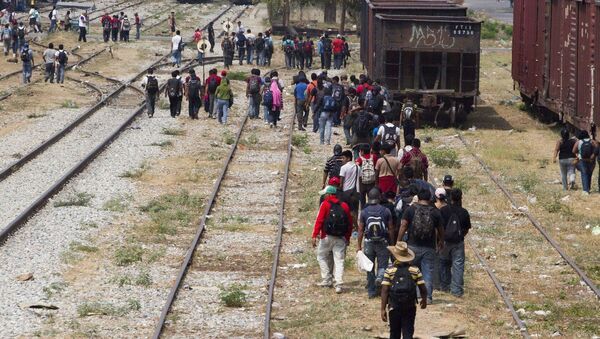The Supreme Court is set to hear oral arguments in the case of United States v. Texas on April 18. It’s a case that will determine the fate of more than 4.3 million immigrant men, women children who were shielded from deportation by President Obama’s November 2014 executive orders. A federal district court in Texas ruled that President Obama’s executive action was unconstitutional and that the 4.3 million people must be deported under US law. The 5th Circuit Court of Appeals upheld this ruling. The matter is now before the US Supreme Court on appeal.
Loud & Clear’s Brian Becker sat down with Attorney Allan Diamante of the Mexican-American Bar Association and Juan Jose Gutierrez of the Full Rights for Immigrants Coalition, to discuss the upcoming oral arguments and what to expect.
What is the case about?
Diamante explains that the case is about President Obama’s executive actions to expand DAPA, or Deferred Action for Parents of Americans, and DACA, Deferred Action for Children Arrivals, two special categories of immigrants that the Obama Administration has refused to take deportation action against, and has further expanded work permit opportunities in order to avoid splitting communities.
"The president announced in November 2014 that he would provide an opportunity to stay the deportation and provide work permit opportunities to parents of citizens as well as residents who have resided in the US continuously since January 1, 2010, so long as these individuals have not committed crimes that would make them ineligible like significant misdemeanours or felonies," said Diamante.
Furthermore, the president’s executive action would provide additional protection to "Dreamers," children who came in the United States and have completed high school or a GED program and who have hopes of attending college.
Will there be a reversal of the lower court ruling?
"There is ample precedent supporting the president’s use of the executive order in regards to these cases," explained Gutierrez. "The Supreme Court decided to take up this case to resolve the question of whether the President of the United States has authority to make use of prosecutorial discretion in deciding where the government needs to invest its limited resources in enforcing immigration law or whether those decisions need to be made by individual agencies and prosecutors."
Gutierrez remained hopeful that the decision would end in favour of the immigrant community. He noted that people have been calling for action for three decades but, due to the politics of congressional gridlock, there hasn’t been action on this pressing issue, which forced President Obama to intervene.
"It has been 30 years since we had major immigration reform, we have to go back to the 1986 Amnesty Law that defined major immigration reform so the community has been expecting comprehensive immigration reform for some time and the best thing that has happened are these executive actions under DACA-II and DAPA," said Gutierrez.
What are the fears of immigrant families?
"The reality is very sad. These people live in fear every day," said Diamante. "The separation of families creates fear, especially for children. I have seen instances of PTSD among children who have seen their parents deported, and their stress of being separated from a breadwinner. The community is very fearful."
Are parents deported despite the children being natural born US citizens?
"Yes," exclaimed Diamante. "They are forced to leave their parents, are left with other family members, or these kids are tossed into the foster care system."
"From the outset, there is a filing after the president’s executive order is made and you have 25 other states joining Texas, all of them red states, Republican states playing politics," added Diamante. "At the same time, you had Sheriff Arpaio in Arizona who has been the vanguard of the anti-immigrant movement file a lawsuit and his case failed in the DC Circuit Court."
Diamante wholly expects that the Supreme Court will overturn the Texas federal court ruling affirmed by the 5th Circuit, saying it is "ridiculous these courts ruled the way they did because the President does have the power to enforce immigration laws, it was given to him by Congress, and it has been used multiple times since Eisenhower."
Eisenhower’s plan, dubbed "Operation Wetback" — a racist term that was the formal name of the program — is actually an example of the president’s discretionary authority of how strongly the office can implement immigration laws. In 1954 under this program, Eisenhower rounded up "over 1 million mostly Mexican immigrants and ‘repatriated’ them back to Mexico in trains," explained Gutierrez.
Donald Trump calls for reinstituting “Operation Wetback” to deport over 11 million immigrants. What is the response among the immigrant community?
"It is really surprising that someone in the aftermath of the defeat of fascist troops in WWII would undertake the ideology of Nazi Germany to justify that the only way to make our country again is to engage in these racially charged political practices," said Gutierrez. "And it is important to underscore that many of the deported in 1954 were actually US citizens caught in the dragnet and deported without Due Process of law. They never saw a judge. They were just placed in trains and sent back to Mexico."
Gutierrez trusts that the plight of America’s undocumented immigrants will improve, despite a swell of anti-immigrant racism from far-right American politicians.
"The more the immigrant community and its allies continue to insist on the need for immigration reform with a path to citizenship, and the more awareness that immigrants are good for America and the economy, the closer we’ll get to accomplishing immigrant reform. This is a country built by immigrants, and it will continue to be."






